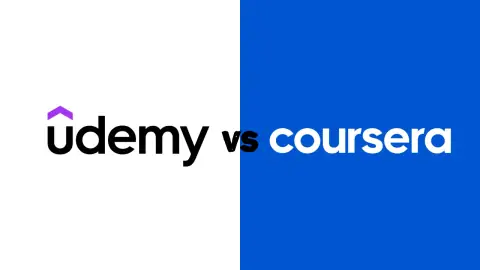
Online learning has become a popular way to gain new skills and knowledge without attending traditional classes. With so many online learning platforms, choosing the best one for your needs can be challenging. Two of the most popular online learning platforms are Udemy and Coursera. This article will compare Udemy vs. Coursera and help you decide which is better.
Udemy Vs. Coursera
Overview of Udemy and Coursera
Udemy is an online learning platform that was founded in 2010. It is a marketplace where instructors can create and sell business, technology, health, and personal development courses. Udemy has a massive library of courses, with over 155,000 courses available. The Udemy courses are designed to be practical and provide learners with the skills they need to succeed in their chosen field.
Coursera, on the other hand, is a platform that partners with universities and other institutions to offer online courses and even entire degree programs. It was founded in 2012 and offered over 4,000 courses from more than 200 institutions. Coursera courses are more academic and cover various subjects, from computer science and engineering to humanities and social sciences.
Pricing
When it comes to pricing, Udemy and Coursera have different approaches. Udemy courses are priced individually, varying depending on the course and instructor. However, Udemy regularly runs sales, which means you can often find classes at a discounted price.
On the other hand, Coursera offers both free and paid courses. Some courses are free, while others require payment to access the content. If you want to earn a certificate or degree, you must pay for the course.
Course Selection
Regarding course selection, Udemy offers a broader range of courses, with courses available in almost every topic imaginable. Udemy courses are also designed to be shorter and more focused, meaning you can complete a course in hours or days.
On the other hand, Coursera offers more academic courses and has partnerships with some of the world's top universities, such as Stanford, Yale, and Princeton. Coursera courses are more in-depth and can take weeks or months to complete.
Teaching Methodologies
Experts in their fields often create Udemy courses, and the teaching methodology varies depending on the instructor. Some courses include video lectures, while others may include written materials, quizzes, and assignments. Udemy courses also offer much flexibility, as you can learn at your own pace and access the course materials whenever you want.
Universities and institutions create Coursera courses, and the teaching methodology is more structured. The courses usually include video lectures, quizzes, and assignments. Some courses also offer live classes and discussion forums, which allow learners to interact with other students and instructors.
RELATED: Udemy Vs Skillshare - Which Is The Better Option To Choose In 2023?
Certificate of Completion and Accreditation
Both Udemy and Coursera offer certificates of completion when you finish a course. However, the certificates have different values. Udemy certificates are
not accredited and only carry weight within the Udemy platform. On the other hand, Coursera certificates are certified by the partnering institution and can be used to showcase your skills and knowledge to employers.
If you're looking for accreditation, Coursera is the better option. Coursera courses are accredited by top universities and institutions, which means you can add the certificate to your resume and showcase your knowledge and skills to potential employers.
Udemy vs. Coursera: Pros & Cons
Udemy Pros:
- Affordable: Udemy courses are often cheaper than Coursera courses, especially when discounts are available.
- Practical skills: Udemy courses are focused on practical skills and are designed to be shorter and more focused, meaning you can complete a trial in hours or days.
- Wide range of subjects: Udemy offers a wide range of subjects, from business and technology to personal development and lifestyle.
- Self-paced learning: Udemy courses allow for self-paced learning, which means you can learn at your speed and schedule.
- No prerequisites required: Udemy courses don't need any conditions or prior knowledge, making them accessible to everyone.
Udemy Cons:
- No accreditation: Udemy certificates are not accredited and carry no weight outside the Udemy platform.
- Variable course quality: Udemy courses are created by independent instructors, which means that the quality of the courses can vary widely.
- Limited interaction: Udemy courses have limited interaction with instructors or other students, making it difficult to ask questions and get feedback.
Coursera Pros:
- Accreditation: Coursera courses are accredited by partnering institutions and can be used to showcase knowledge and skills to potential employers.
- Theoretical approach: Coursera courses are more academic and cover various subjects, from computer science and engineering to humanities and social sciences.
- Top-tier partnerships: Coursera has alliances with top universities and institutions, offering more prestige and accreditation for your accomplishments.
- Interactive learning: Coursera courses offer interactive learning experiences, including video lectures, quizzes, and discussions with other students.
- Full degree programs: Coursera offers complete degree programs from top universities, allowing you to earn a degree online.
Coursera Cons:
- Expensive: Coursera courses can be more costly than Udemy courses, especially if you want to earn a degree or receive academic credit.
- Time-consuming: Coursera courses are more in-depth and can take weeks or months to complete.
- Prerequisites required: Coursera courses often require prior knowledge or conditions, making them more challenging to access for some learners.
- Less flexible: Coursera courses have set start and end dates, so you must follow a structured schedule.
- Limited choice: While Coursera offers a wide range of subjects, the selection of courses may be more limited than Udemy, especially for niche or specialized topics.
Conclusion
Both Udemy and Coursera offer much value to learners, but they have different approaches and target different types of learners. If you're looking for practical skills and want to learn from experts in various fields, Udemy may be the better option. Udemy courses are focused on practical skills and are designed to be shorter and more focused, meaning you can complete a course in hours or days. Additionally, Udemy courses are often more affordable than Coursera courses, especially when discounts are available.
On the other hand, if you're looking for a more structured academic approach and want to earn university credit or even a degree, Coursera may be the better choice. Coursera courses are more theoretical and cover various subjects, from computer science and engineering to humanities and social sciences. Coursera's partnerships with top universities and institutions offer more prestige and accreditation for your accomplishments.
Ultimately, The decision between Udemy and Coursera depends on your preferences and learning goals. If you want to gain practical skills quickly and affordably, Udemy may be the better option. If you're looking for more in-depth knowledge and academic accreditation, Coursera is likely the better choice.
FAQS
Are Udemy courses more affordable than Coursera courses?
Yes, Udemy courses are often more affordable than Coursera courses, especially when discounts are available.
Are Udemy certificates accredited?
No, Udemy certificates are not accredited, and they do not carry any weight outside of the Udemy platform.
Can Coursera certificates be used to showcase knowledge and skills to employers?
Yes, Coursera certificates are accredited by partnering institutions and can be used to showcase knowledge and skills to potential employers.
Are Udemy courses more focused and shorter in duration compared to Coursera courses?
Yes, Udemy courses are designed to be shorter and more focused, which means you can complete a course in hours or days. Coursera courses are more in-depth and can take weeks or months to complete.
Which platform should I choose if I want to earn a degree?
If you want to earn a degree, Coursera may be the better option, as it partners with top universities and institutions to offer complete degree programs.












